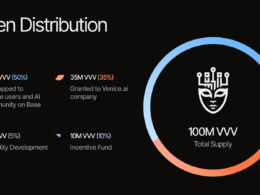Bitcoin’s fee rate slashed by 90%! Are miners struggling, or is crypto just evolving? Dive into the fee dynamics! #Bitcoin #CryptoNews #Blockchain
- The Reduction in Bitcoin Transaction Fees: What It Means
- The Evolution of Bitcoin Transaction Fees
- Main Insights on Bitcoin Fee Reduction
- Challenges in Sustaining Low Fees
- The Future of Bitcoin Transaction Fees
- Final Reflections on Bitcoin’s Transaction Ecosystem
The Reduction in Bitcoin Transaction Fees: What It Means
In a recent maneuver that has captured the attention of both seasoned investors and crypto novices alike, the cost to send transactions on the Bitcoin network has dramatically decreased. The minimum fee rate for processing Bitcoin transactions has been slashed by a staggering 90%, allowing users to pay as low as 0.1 satoshi per virtual byte (sat/vByte). This reduction raises critical questions about the implications for the Bitcoin network, its users, and the broader cryptocurrency ecosystem.
The Bitcoin network, renowned for its decentralized nature, is fundamentally driven by miners. These miners, who are often large-scale industrial operations, validate transactions and add them to the blockchain. In return, they are rewarded with newly minted bitcoins and transaction fees. The recent fee reduction highlights a crucial shift in demand for block space, indicating fewer transactions and prompting the need for a deeper exploration into the reasons behind this trend and its potential impact.
The Evolution of Bitcoin Transaction Fees
Bitcoin’s journey from a niche digital currency to a mainstream financial instrument has been nothing short of remarkable. Initially conceived as a peer-to-peer electronic cash system, Bitcoin’s primary purpose was to facilitate transactions without the need for intermediaries. In its early days, Bitcoin transactions were virtually free, as the network was not congested, and miners prioritized transactions based on their chronological order.
As Bitcoin gained popularity, the network experienced significant congestion, leading to increased transaction fees. This congestion was compounded by the limited block size, which restricted the number of transactions that could be processed at any given time. Consequently, users began to offer higher fees to incentivize miners to prioritize their transactions, resulting in a competitive fee market.
The introduction of the Segregated Witness (SegWit) protocol in 2017 aimed to address these scalability issues by allowing more transactions to fit within each block. However, despite these improvements, transaction fees remained a contentious topic within the Bitcoin community, with debates centering around whether Bitcoin should primarily serve as a store of value or a medium of exchange.
Main Insights on Bitcoin Fee Reduction
The Current State of Bitcoin Fees
The recent reduction in transaction fees to 0.1 sat/vByte is a significant departure from the previous minimum of 1 sat/vByte. This change suggests a noticeable decrease in network activity, prompting miners to lower fees to encourage transaction throughput. The decline in activity can be attributed to several factors, including the growing use of alternative cryptocurrencies for transactions, the rise of the Lightning Network for off-chain transactions, and the perception of Bitcoin as a store of value rather than a medium of exchange.
Implications for Miners
The reduction in transaction fees poses a challenge for miners, who rely on these fees as a source of revenue. While miners continue to receive block rewards for validating transactions, the decreasing fees may impact their profitability, especially as the block reward is halved approximately every four years. This dynamic could lead to a consolidation of mining operations, favoring those with economies of scale and access to cheaper electricity.
The Store of Value Debate
The fee reduction reignites the longstanding debate over Bitcoin’s role as a store of value versus a medium of exchange. High transaction fees have traditionally been cited as a barrier to Bitcoin’s use in everyday transactions. However, as fees decrease, there is potential for Bitcoin to regain its utility as a transactional currency, provided that the network can handle increased volumes without reverting to its previous congestion issues.
User Experience and Adoption
For users, the lower transaction fees present an opportunity to engage with the Bitcoin network at a reduced cost. This accessibility could encourage new users to explore Bitcoin, potentially driving adoption and network effects. However, the long-term sustainability of these low fees is contingent upon maintaining a balance between transaction throughput and network security.
Challenges in Sustaining Low Fees
Network Security Concerns
One of the primary challenges associated with lower transaction fees is maintaining network security. Transaction fees serve as an incentive for miners to validate transactions and secure the network against potential attacks. As fees decrease, there is a risk that miners may prioritize other blockchain networks with higher profitability, potentially compromising Bitcoin’s security.
Economic Incentives for Miners
The economic incentives for miners are closely tied to transaction fees and block rewards. As the Bitcoin network continues to evolve, it is crucial to ensure that miners remain financially motivated to secure the blockchain. Innovative solutions, such as the implementation of more efficient mining hardware and the exploration of alternative consensus mechanisms, may be necessary to address these challenges.
Balancing Transaction Speed and Cost
Achieving a balance between transaction speed and cost is a persistent challenge for the Bitcoin network. While lower fees may encourage more transactions, they can also lead to longer confirmation times if the network becomes congested. Implementing solutions like the Lightning Network and increasing SegWit adoption can help mitigate these issues, providing faster and cheaper transactions.
The Future of Bitcoin Transaction Fees
Emerging Trends and Predictions
As the Bitcoin ecosystem continues to mature, several trends are likely to shape the future of transaction fees. The adoption of layer 2 scaling solutions, such as the Lightning Network, is expected to increase, offering users faster and cheaper transactions. Additionally, ongoing developments in privacy enhancements and smart contract capabilities could further expand Bitcoin’s use cases and drive demand for block space.
The Role of Regulation
Regulatory developments will also play a significant role in shaping the future of Bitcoin transaction fees. As governments and financial institutions continue to explore the integration of digital currencies, regulatory clarity and compliance requirements may influence transaction costs and network activity.
The Impact of Institutional Adoption
Institutional adoption of Bitcoin as a store of value and investment vehicle is likely to exert upward pressure on transaction fees. As institutional players allocate capital to Bitcoin, the demand for secure and timely transactions may increase, potentially leading to higher fees and greater competition for block space.
Final Reflections on Bitcoin’s Transaction Ecosystem
The recent reduction in Bitcoin transaction fees presents a complex landscape with both opportunities and challenges. While lower fees enhance accessibility and user experience, they also raise concerns about network security and miner incentives. As the Bitcoin ecosystem continues to evolve, it is essential to strike a balance between maintaining low fees and ensuring the network’s long-term sustainability.
Bitcoin’s journey from a peer-to-peer electronic cash system to a globally recognized store of value highlights its adaptability and resilience. As the network navigates the challenges of scalability and security, innovative solutions and strategic collaborations will be crucial in shaping the future of Bitcoin’s transaction ecosystem. By embracing these changes, the Bitcoin community can continue to drive adoption and solidify its position as a cornerstone of the digital economy.











